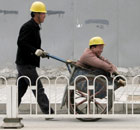Global General
Papal letter fails to calm anger over Irish abuses
(Agencies)
Updated: 2010-03-21 11:45
 |
Large Medium Small |
VATICAN CITY - Pope Benedict apologised on Saturday to victims of child sex abuse by clergy in Ireland and ordered an official inquiry there to try to stem a scandal gripping the Catholic Church which has swept across Europe.
The pope's pronouncement on abuse at Irish dioceses and seminaries was the most concrete step taken since a wave of cases hit Ireland, Germany, Austria and the Netherlands.
Victims in Ireland voiced deep disappointment it did not go further, and a US-based Catholic group said it should have addressed abuses throughout the Church, not just in Ireland.
"You have suffered grievously and I am truly sorry ... I openly express the shame and remorse that we all feel," he said.
"I can only share in the dismay and sense of betrayal that so many of you have experienced on learning of these sinful and criminal acts and the way the Church authorities in Ireland dealt with them."
A report commissioned by the Irish government had said one priest admitted abusing more than 100 children. Another said he had abused children every two weeks for more than 25 years.
The pope in the letter failed to address widespread calls in Ireland for a radical restructuring of the Church, nor did he say that bishops implicated in the scandal should resign.
Irish victims accused the pope of evading the question of Vatican responsibility in the long-awaited, eight-page letter.
"We feel the letter falls far short of addressing the concerns of the victims," Maeve Lewis of the group One in Four told Reuters. She said it focused too narrowly on Irish Catholic leaders without scrutinising the role of the Vatican.
"There is nothing in this letter to suggest that any new vision of leadership in the Catholic Church exists," she said, adding it should have addressed the fate of head of the Church in Ireland, Cardinal Sean Brady, who victims want to quit.
Speaking after a mass on Saturday in Northern Ireland, Brady did not refer to resigning. "I welcome this letter," he said.
The pope ordered what is known as an "apostolic visitation" of "certain" dioceses, seminaries and religious orders.










